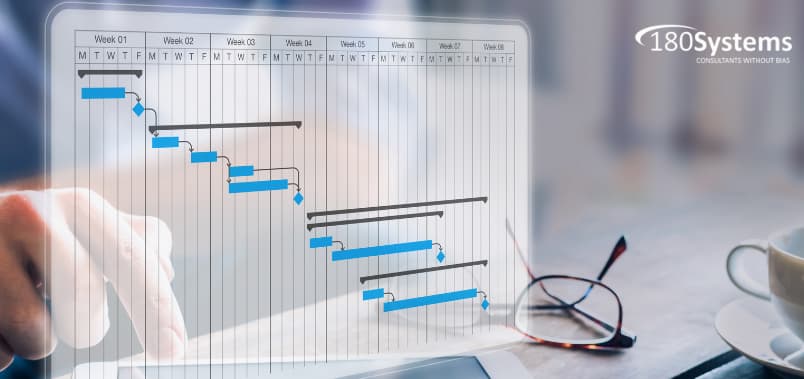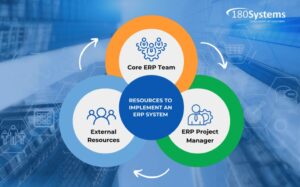This blog is about:
- How much time it takes to implement an ERP system.
- What resources you need for an ERP implementation.
Time to implement an ERP System
Can you trust the vendor’s estimate on the time it takes to implement their ERP System?
You have a few options:
- Hope for the best based on trust.
- Evaluate whether the numbers are reasonable.
- Throw a dart at the wall which contains ranges of estimates.
Option 1: Hope for the best based on trust
This option is risky, but you can mitigate the risks by:
- Get to know the implementer very well and vice versa to the extent that you are partners in the implementation.
- Talk to their clients.
- Try to get a clear definition of what’s included in scope. Ideally scope is linked to your requirements.
- Understand the roles and responsibilities of the implementation for you and the implementer.
- Compare to estimates from the other implementers.
- Interview key members of the implementer’s team.
- Assign a good project manager. See below for a description.
- Assign an ERP core team to the project. See below for a description.
- Understand that more time may be required from the implementation core team during certain stages of the project such as testing and GoLive prep.
- Plan that there will be times during the year when it will be difficult to allocate sufficient time to the project such as financial year-end, summer vacation, or seasonality.
- Expect a difficult implementation and build in contingency time.
Option 2: Evaluate whether the numbers are reasonable
All the suggestions for option 1 apply plus:
- Understand which of your requirements are included and which are excluded.
- Get a detailed project plan from the implementer that includes the project’s critical path, key milestones, hours broken out by implementer role and by task along with timelines.
- Understand what is involved for each task and the deliverables. The tasks should be linked to the implementer’s methodology and detailed enough to evaluate whether sufficient time has been provided.
- Validate you have the resources, skillsets, and capacity to complete all tasks assigned to your team in the allocated time. Usually, most project delays come from the client side.
- Read the fine print in the statement of work including assumptions and exclusions.
- Plan to have frequent check-ins to monitor and adjust the timeline based on progress and resource constraints.
When you have unique requirements, however, you should consider doing even more. Thus, ask the implementer to do a paid-for business needs analysis on the unique requirements that could require customization or integration in advance of signing a long-term contract.
Option 3 – Throw a dart at the wall which contains ranges of estimates.
Start looking for a new job.
Resources for ERP Implementation
For a successful ERP implementation, the right team and leadership are critical:
1. Core ERP Team
You should try to assign your best people to the ERP implementation project. They need to have the confidence of their colleagues, know the business very well, and will do whatever it takes to be successful. However, make sure they were also involved in the selection process too and had a say in which system was selected. The implementation is going to take time and so you must reduce their normal workload. The core ERP team will have the following responsibilities:
- Meet regularly with vendors and internal team.
- Monitor implementation.
- Approve design of processes and reports.
- Approve whether testing has been completed successfully.
- Determine whether milestones have been met.
- Determine when to go-live.
2. ERP Project Manager
Select a project manager for the ERP implementation with the following attributes:
- Project management experience
- Respect of organization
- Knows how to say “no” or “later”
- Leadership skills
- Effective communication skills
- Problem solving skills; and
- Enthusiasm
With the following responsibilities:
- Develop a well-structured project work plan that clearly defines the governance, scope, resource requirements, risk management (identification and mitigation), timeline, and budget for the project.
- Manage the project, work plan, resources, budget and scope and track progress.
- Provide leadership and work with team leads to prioritize and coordinate activities and resources.
- Ensure continuous alignment with the mission and initial objectives of the project.
- Monitor both key project resources and overall culture, escalating concerns to Project Sponsor.
- Monitor unresolved issues and pending decisions on a regular basis.
- Manage risk and implement appropriate mitigation strategies. Significant or major risks will be brought to the project Steering Committee.
3. External Resources
You may need to backfill internal resources to allow them to allocate more time the implementation project. Also, you should consider external resources for ERP implementation project management, data migration, and change management.
Please consider 180 Systems.

